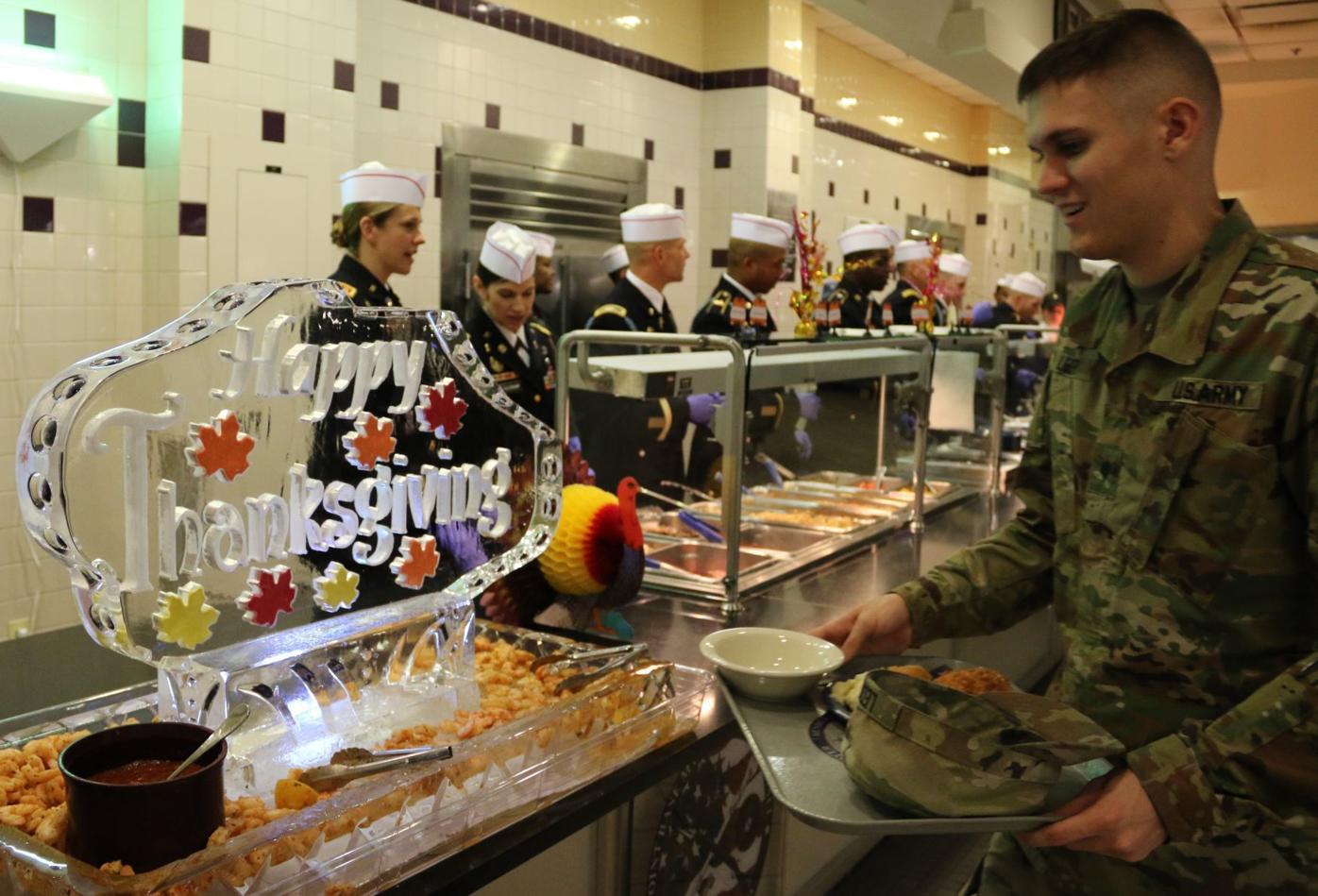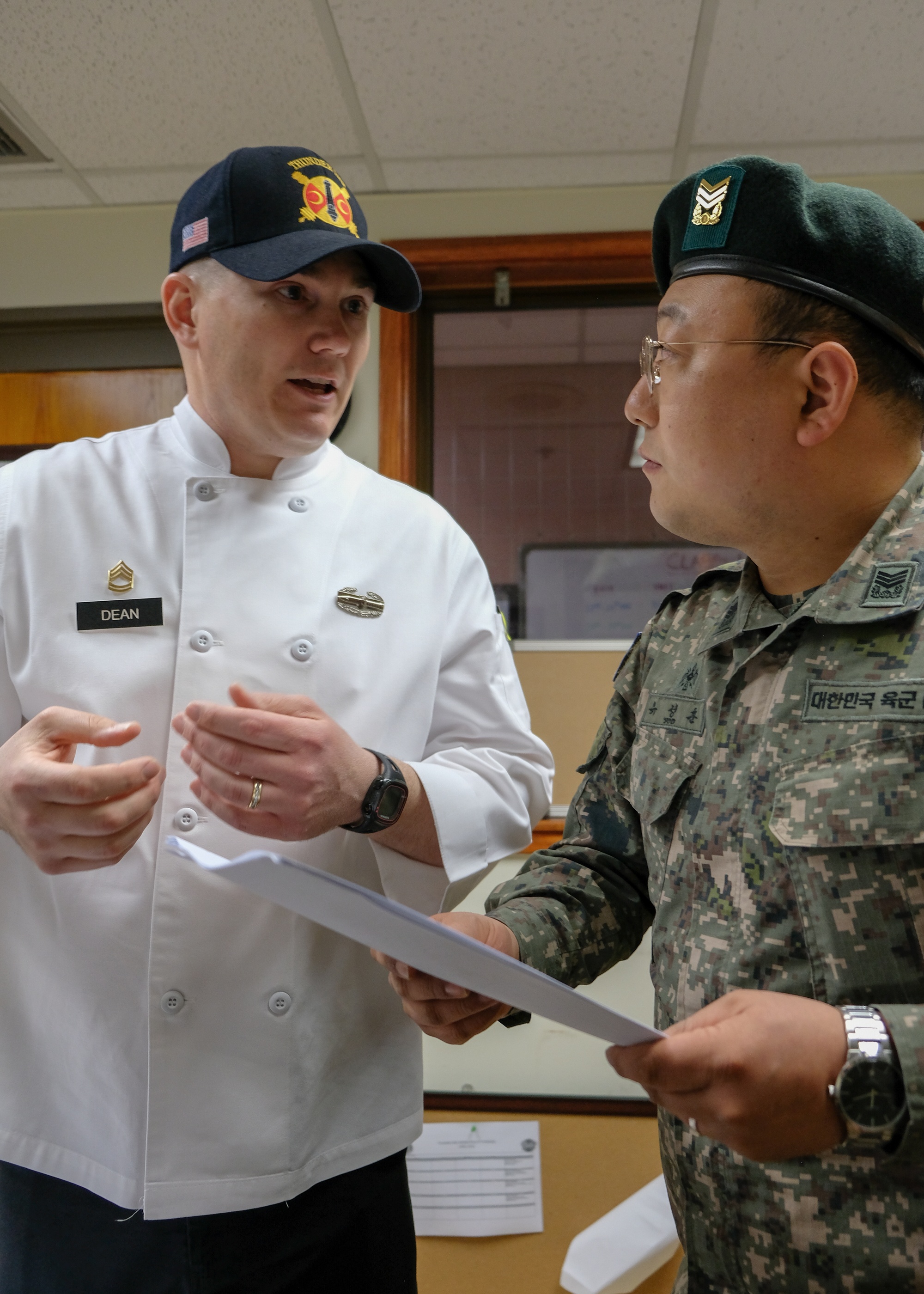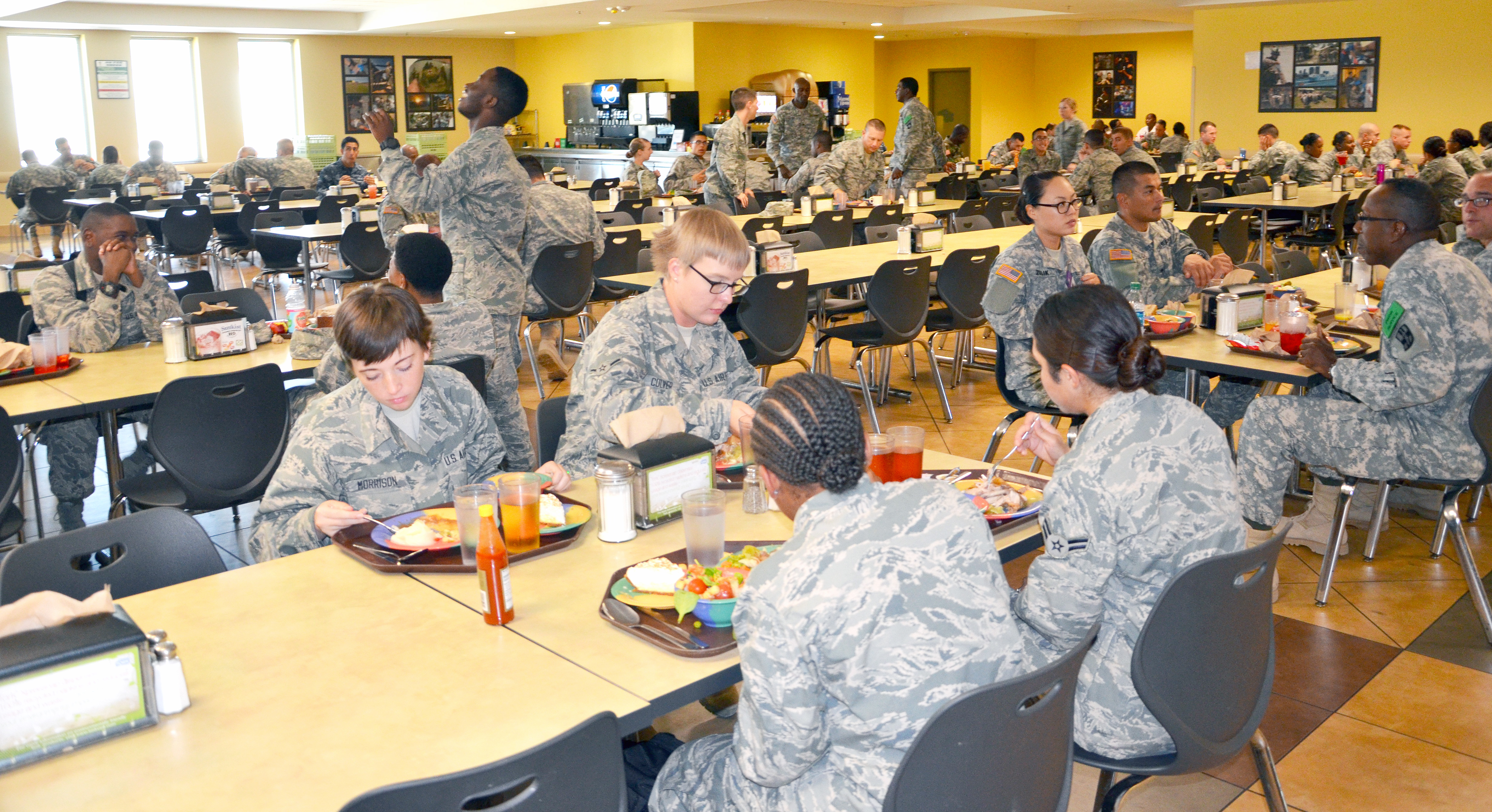Dfac Military - Sergeant Miriam M. Weeden, NCO G1 Strength of the 19th Expeditionary Maintenance Corps and a man from Muskogee, Oklahoma, grab a plate of vegetables at the newly opened dining facility at Camp Henry, South Korea, Feb. 17.
Under a new Army policy called Essential Unit Messing, non-commissioned officers in rotating units in South Korea are required to eat at Army canteens unless they want to pay for their meals out of their own pockets. Officers are also guaranteed three DFAC meals per day, but still at personal expense.
Dfac Military

The policy, which went into effect Feb. 1, applies to all soldiers in operations on the peninsula, Army spokesman Paul Prince said.
Why Do People Complain About Dfac Food?
The 1st Brigade Combat Team of the 1st Cavalry Division, which had just begun a nine-month deployment to South Korea, was the first to experience the change.
Under the EUM, soldiers are fed through military canteen facilities. Deducting the cost of food is deducted from the soldier's basic cost of living.
The EUM transition was made "to ensure the health and readiness of our soldiers during a long-term deployment to South Korea," Prince said.
After learning about the new policy, some readers wrote to Army Times complaining that they or their soldiers were unfairly losing their BAS during deployment.
Local Dfacs Rise To The Top
"BAS is not being denied," Prince said in response to an Army Times question.
According to information from the Department of Defense, BAS is intended to offset military food costs. It does not cover the cost of food for the family.
Maj. gen. Ted Martin, commander of the ROK's 2nd Infantry Division, acknowledged that the EUM was "a big change."

"It's a big culture shift for soldiers and their families, and we understand that," he said. I understand.
Don't Eat At The Dfac
But EUM makes sure soldiers deployed to South Korea get three balanced, nutritious meals a day, said Martin, who also regularly eats in the cafeteria. I will add that there is.
"Every soldier, from new privates to brigade commanders and sergeants, has a ration card," he said. , This is a good place to eat. I know the financial conditions are different, but really, there is nothing better than army food."
Under the EUM, all soldiers, regardless of rank, are given three meals a day and are paid $10.45 per day, said Lieutenant Colonel Sunset Belinsky, a spokeswoman for the 1st Cavalry Division. .
Enlisted soldiers have a monthly BAS of $368.29 minus $313.50 for a net BAS of $54.79, he said.
Dfac Hi Res Stock Photography And Images
Officers also have $313.50 per month deducted from their monthly BAS. The monthly BAS is $253.63, Belinsky said, so executives pay $59.87 out of pocket.
Soldiers from Headquarters and Headquarters Company, 1st Armored Brigade Combat Team, and 1st Cavalry Division unload shipping containers during the chilly early morning hours at Camp Hobie, South Korea, Feb. 4.
Some of the impetus for the new EUM policy came from problems that army leaders discovered shortly after 4,000 soldiers of the 2nd Brigade Combat Team of the 1st Cavalry Division arrived in South Korea in June.

The brigade is the first rotating brigade combat team serving in South Korea. This deployment coincides with the decommissioning of the 1st BCT of the 2nd Infantry Division, which has been stationed in South Korea for 50 years, but is manned by separately deployed soldiers from the United States each year.
West Fort Hood Dining Hall Earns Post's Top Title
As a new deployment, the leaders were forced to consider issues such as what kind of deployment order to issue to the soldiers and whether to receive meal cards to eat in the canteen.
Some issues are simpler. In the case of the 2nd BCT, the South Korean commander did not realize there were no beds for the barracks until the soldiers arrived. Soldiers were then given Army-style blankets, pillowcases, and blankets.
Leaders of the 1st Brigade Combat Team of the 1st Cavalry Division "are making a concerted effort" to inform soldiers and their families of eligibility differences due to policy changes between rotations, it said. Belinsky.
The 1st BCT commander, Colonel John Dijanbattista, "personally informed each battalion of all our qualifications," he said.
Monarch Dfac Leads The Way In Automating Food Preparation > Travis Air Force Base > News
"Many families see the BAS as a credential that is earned regardless, and is not really intended for soldier nutrition," he said. "As we move to the Essential Unit Messing, we understand that the funds are used to pay for food here, so this will change the way soldiers look at rights."
DiGiambattista said he believes the DFAC diet will ensure soldiers have enough healthy food options and opportunities.
"We're continually looking at ways to do this better, so everyone gets what they need when it comes to nutrition," he said. The nutrition that we provide in our canteens is the best option to provide what our soldiers need. , if it is food. or something like that.

Because the EUM policy is so new, it does not apply to 2nd Brigade Combat Team soldiers who completed their nine-month rotation this month. The delegation ceremony for the two brigades will be held on Friday.
Knight's Table Military Dining Facility
Belinsky said soldiers in the 2nd BCT did not have an EUM, so they received BAS as usual. When they eat in the cafeteria, they are separated each time, he said, and receive the government food rate of $13.85 a day as a per diem.
When the 2nd BCT began deploying early last summer, 2nd Infantry Division leaders were already looking to invest more money in the canteen facility. Based on soldier feedback, improvements were made to the blenders for fruit and protein shakes, panini press and waffle iron.
During the deployment of the 2nd BCT, perhaps 900 to 1,100 soldiers used the dining room, while others bought their own groceries, ate to save money, or sent a letter to another restaurant for 1. We went to one, Martin said.
Soldiers from the 2nd Armored Brigade Combat Team of the 1st Cavalry Division take a tour organized by the Dongducheon City Council to introduce soldiers to Korean culture at Haneul Local Restaurant in Dongducheon, South Korea, Sept. 2. Eat authentic Korean food inside.
Military Report: Army Cooks Serve Their Country By Serving Others
A soldier eats authentic Korean food at Haneul local restaurant in Dongducheon, South Korea, on a tour sponsored by Dongducheon, South Korea.
"Our headcount is going to increase a lot," he said, because everyone in the 1st BCT will feed into the DFAC.
"When we saw this coming, it was a major maneuver by the department to set it up for success," Martin said. "We need more forks and knives. I have to take this seriously."

They hired more cooks and kitchen staff and ran three load tests to make sure the division's DFAC could handle the extra soldiers.
Dfac Manager Ambushes Soldiers With Healthy Food
"We gave all the soldiers orders for a day to test how well we were going to do it," Martin said. I check if it is possible and how long they will wait in line."
The department tested DFAC three times in three months, and "we hit the sweet spot," Martin said.
Because the soldiers are away from their families, "we put a lot of money into the canteen so that the soldiers look forward to going there and it's a place where camaraderie is built," he said. "There's still a little work to do, but I'm very happy with what I see."
To further reduce the burden on the DFAC, the 1st BCT adjusted the soldiers' work schedules to ensure they had time to eat, DiGiambattista said. For example, some battalions start their morning physical training earlier than others, so not all soldiers try to eat breakfast at the same time.
Half Hour Of Power' Comes To Stack Dfac
In addition, the work day starts about 30 minutes later so the soldiers have time to get food, he said.
"When we talk about Essential Unit Messing, it's very emotional and there's no way around the emotions involved." We look at every part of the process, from wait times to food quality to nutritional value. We take care of our soldiers."
Michelle Tan is the editor of Army Times and Air Force Times. He has covered the military for The Military Times since 2005 and deployed US troops to Iraq, Afghanistan, Kuwait, Haiti, Gabon and the Horn of Africa.
Medevac team successfully transports premature baby from Kuwait to Germany Airlift team responds quickly
Warfighter Wins Top Garrison Dfac Award
Dfac soccer, dfac jobs, military dfac, dfac, dfac dunedin, fort hood dfac, dfac military slang, fulton county dfac, camp humphreys dfac, camiones dfac, dfac georgia, ft carson dfac

0 Comments